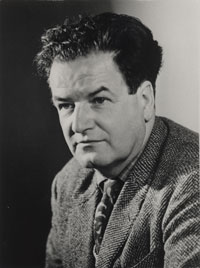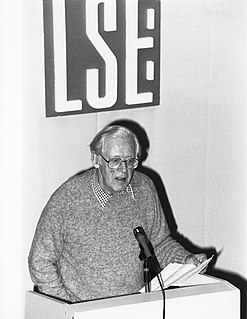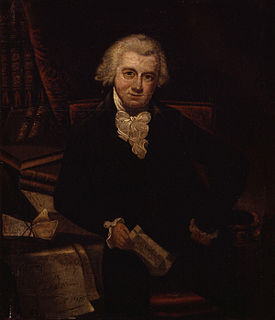Further reading
- Middleton, Alex. "‘High Politics’ and its Intellectual Contexts." Parliamentary History 40.1 (2021): 168-191. online
Boyd Hilton | |
|---|---|
| Born | 19 January 1944 |
| Academic background | |
| Academic work | |
| Main interests | British history from the mid-18th century to the mid-19th century |
| Notable works | A Mad, Bad, and Dangerous People? England 1783–1846 |
Andrew John Boyd Hilton, FBA (born 1944) [2] is a British historian and a professor and fellow of Trinity College, Cambridge. He specialises in modern British history, from the mid-18th century to the mid-19th century.
Hilton was educated at William Hulme's Grammar School, Manchester, and New College, Oxford, where he obtained a first class honours degree in Modern History. From 1969 to 1974 he was a research lecturer at Christ Church, Oxford. He was elected a fellow of Trinity College in 1974. [1]
In 2007, Hilton was promoted by Cambridge to an ad hominem professorship [3] and—"partly on the strength of his widely acclaimed ... volume in the New Oxford History of England " [3] —a Fellow of the British Academy. [4]
A Mad, Bad, and Dangerous People? England 1783–1846, published in 2006, is part of the New Oxford History of England. [5] In a 2006 review, Tristram Hunt (a former undergraduate of Hilton's college) called it a "lively and wide-ranging study that is mercifully free of dry chronology" and a "comprehensive, intriguing and challenging volume"; he notes it includes "studies of Pitt, Fox, Liverpool and Canning" as well as "accounts of phrenology, mesmerism and even early 19th-century flagellatory literature" and a "welcome concentration on economic and business matters". [6]
Email from the author, May 4, 2010 (Andrew John Boyd Hilton, b. 19 January 1944; professor and fellow of Trinity College and the Faculty of History, Cambridge University)

William Lamb, 2nd Viscount Melbourne,, in some sources called Henry William Lamb, was a British Whig statesman who served as Home Secretary (1830–1834) and Prime Minister. He is best known for being prime minister in Queen Victoria's early years and coaching her in the ways of politics, acting almost as her private secretary. Historians have concluded that Melbourne does not rank highly as a Prime Minister, for there were no great foreign wars or domestic issues to handle, he lacked major achievements, he enunciated no grand principles, and he was involved in several political scandals in the early years of Victoria's reign.
The Clapham Sect, or Clapham Saints, were a group of Church of England social reformers based in Clapham, London, in the early 19th century.

John Edward Christopher Hill was an English Marxist historian and academic, specialising in 17th-century English history. From 1965 to 1978 he was Master of Balliol College, Oxford.

Rodney Howard Hilton was an English Marxist historian of the late medieval period and the transition from feudalism to capitalism.
Sir George Norman Clark, was an English historian, academic and British Army officer. He was the Chichele Professor of Economic History at the University of Oxford from 1931 to 1943 and the Regius Professor of Modern History at The University of Cambridge from 1943 to 1947. He served as Provost of Oriel College, Oxford from 1947 to 1957.

James Lowther, 1st Earl of Lonsdale was an English country landowner and politician who sat in the House of Commons for 27 years from 1757 to 1784, when he was raised to the Peerage of Great Britain as Earl of Lonsdale.

The Days of May was a period of social unrest and political tension in the United Kingdom in May 1832, after Tories in the House of Lords blocked the Third Reform Bill, which aimed to extend parliamentary representation to the middle class and to the newly industrialised cities of the English Midlands and the North of England.
John Stephen Morrill, FBA is a British historian and academic who specialises in the political, religious, social, and cultural history of early-modern Britain from 1500 to 1750, especially the English Civil War. He is best known for his scholarship on Early Modern Politics and his unique county studies approach which he developed at Cambridge. Morrill was educated at Trinity College, Oxford and became a fellow of Selwyn College, Cambridge in 1975.
The Speculative Society is a Scottish Enlightenment society dedicated to public speaking and literary composition, founded in 1764. It was mainly, but not exclusively, an Edinburgh University student organisation. The formal purpose of the Society is as a place for social interchange and for practising of professional competency in rhetoric, argument, and the presentation of papers among fellow members. While continuing to meet in its rooms in the University's Old College, it has no formal links to the University.

John Reeves was a legal historian, civil servant, British magistrate, conservative activist, and the first Chief Justice of Newfoundland. In 1792 he founded the Association for Preserving Liberty and Property against Republicans and Levellers, for the purpose suppressing the "seditious publications" authored by British supporters of the French Revolution—most famously, Thomas Paine's Rights of Man. Because of his counter-revolutionary actions he was regarded by many of his contemporaries as "the saviour of the British state"; in the years after his death, he was warmly remembered as the saviour of ultra-Toryism.
Charles Loch Mowat was a British-born American historian.
The Association for Preserving Liberty and Property against Republicans and Levellers, also known as the Crown and Anchor Society or Crown and Anchor Association, was an English loyalist, anti-Jacobin, anti-Radical society active between late 1792 and June 1793.
The New Oxford History of England is a book series on the history of the British Isles. It was commissioned in 1992 and produced eleven volumes by 2010, but as of February 2020, no more volumes. It is the successor to the Oxford History of England (1934–86).
John Patrick William Ehrman, FBA was a British historian, most notable for his three-volume biography of William Pitt the Younger. He wrote two volumes of the official British History of the Second World War; "Grand Strategy" Volumes V and VI.
George Cannon (1789–1854) was an English solicitor, radical activist and publisher and pornographer who also used the pseudonyms Erasmus Perkins and Philosemus.
Michael Bentley is an English historian of British politics in the nineteenth and early twentieth centuries. Boyd Hilton has called Bentley's Politics Without Democracy 1815–1914 "a wonderfully 'inside' account of life at the top", whilst K. Theodore Hoppen claims the book "provides an interesting study of attitudes".
Alexandra Marie Walsham is an English-Australian academic historian. She specialises in early modern Britain and in the impact of the Protestant and Catholic reformations. Since 2010, she has been Professor of Modern History at the University of Cambridge and a Fellow of Trinity College, Cambridge. She is co-editor of Past & Present and Vice-President of the Royal Historical Society.
Sheilagh Catheren Ogilvie, FBA is a Canadian historian, economist, and academic, specialising in economic history. Since 2004, she has been Professor of Economic History at the University of Cambridge.
Anthony Glenn Cross, FBA is a retired British academic and scholar of modern Russian history. He was Professor of Slavonic Studies at the University of Cambridge between 1985 and 2004.